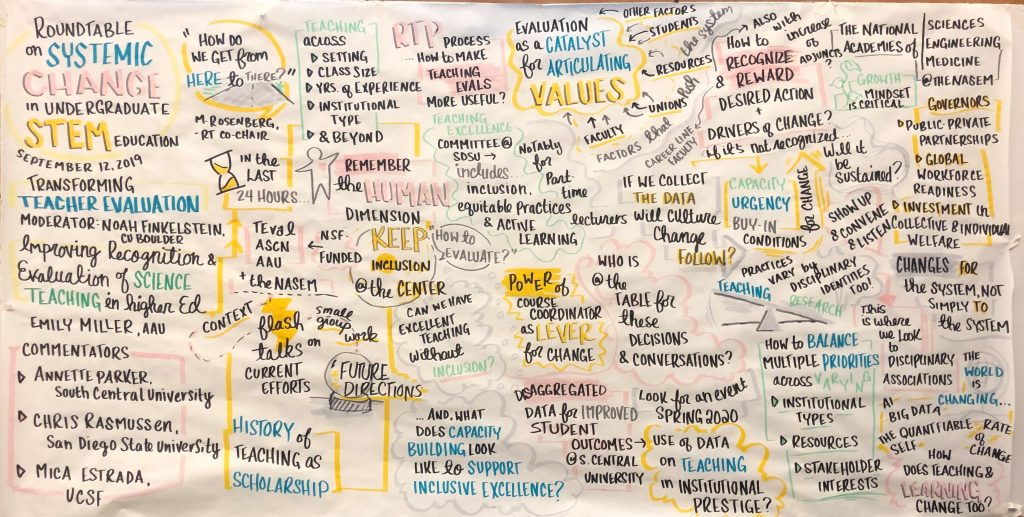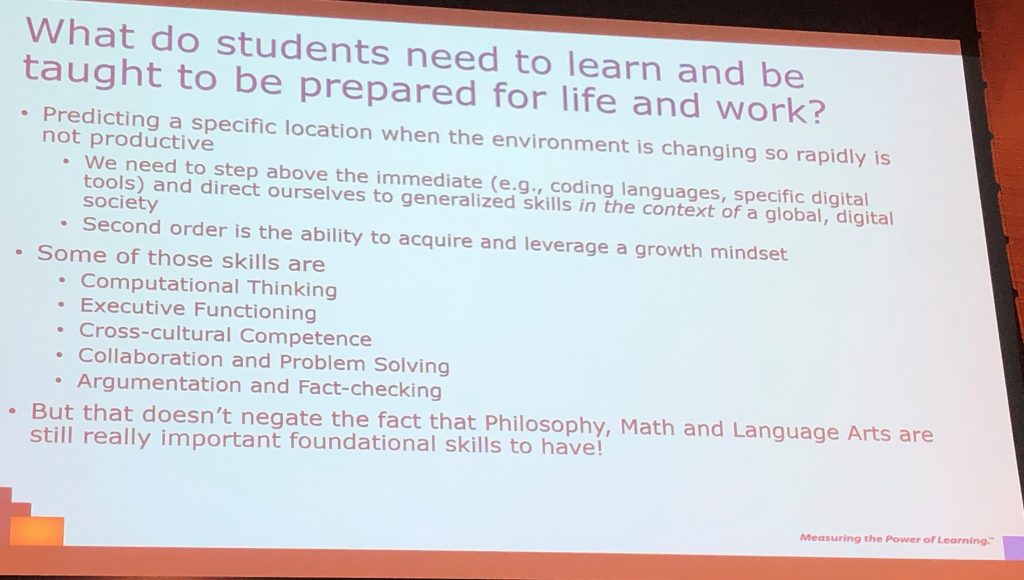October 7, 2019
“Which of my skills can I still use if jobs look totally different in the future?” Takeaways from the Workshop on the Future of Undergraduate STEM Education
Posted by AGU Career Center
From 12-13 September, the National Academies of Sciences, Engineering, and Medicine Roundtable on Systemic Change in Undergraduate STEM Education hosted a public Workshop on the Future of Undergraduate STEM Education.
The meeting goals included learning about trends impacting higher education and discussing the Roundtable’s work to improve teaching evaluation and evidence-based instruction. Participants left not only with new ideas about how to improve student learning in STEM, but also what skills are most important for students to develop in order to keep up with rapidly changing workforce demands.
Underscoring the entire two-day conference was awareness of a broadly uncertain future for academia, the United States, and the world. Globalization, automation, climate change, and technology are advancing exponentially. As faculty and industry professionals voiced thoughts and questions about preparing students for the future, phrases like “dynamic environment,” “unknown landscape,” and “this is not business as usual” frequently cropped up.

Graphic at Workshop on the Future of Undergraduate STEM Education created by Layne Scherer, Program Officer, Board on Higher Education and the Workforce, National Academies of Sciences
Roundtable members and workshop participants agreed on a foundational issue: education will have to look different than ever before, because the future that lies ahead for students, faculty, and citizens alike is going to be different than ever before.
Faculty and experts are grappling with the challenge of training students for the unknown. The workshop brought them together for broad feedback and idea generation regarding how to prepare students not only as competent scientists, but flexible, capable, global citizens.
The unknown: jobs of the future
We can’t know what our world will look like in 20, 10, or even 5 years. With machine learning and artificial intelligence, climate change, and an unknown political landscape, all we know is that changes will come.
Undergraduate students need to be prepared for careers and lives that they and their professors can’t currently imagine. Students need to be prepared for jobs that don’t exist yet. Students need to be prepared for jobs that do currently exist being outsourced to robots that don’t exist yet.
The known: skills and self-reflection students will need for the jobs of the future
Roundtable members, faculty, and mentors put forth conceptions of the qualities of successful modern undergraduates. Students will need to:
- Be interdisciplinary scientists, understanding the connections between scientific disciplines and to the humanities and broad social contexts in which they exist.
- Understand metacognition (thinking about one’s own thinking and learning processes), so they can articulate that to employers and colleagues and explain and give examples of how they problem solve.
- Prepare for higher rates of remote and contract work.
- Ask, “Which of my skills can I still use if jobs look totally different in the future?” Acquire a growth mindset, remain adaptable, and develop generalized skills. (See below slide)
- Think of learning and career as a lifelong arc which builds on itself. Consider not only what they want to do in their 20s, but their 40s and 60s. Work to generate a holistic understanding of themselves and consider: “What kind of life do I want to build?”

Slide from Workshop on the Future of Undergraduate STEM Education panel “Artificial Intelligence and Higher Education,” created and presented by Andreas Oranje, General Manager, Educational Testing Service (ETS)
In the final hours of the workshop, an educator asked, “How do we define student success? Entering the workforce? Becoming a professor? Being happy?” The entire workshop had focused on how educators can best prepare students for success in a changing workforce and a changing world. But until that point there was no agreed-upon operational definition of success, conversation about how that definition may vary with the individual, or discussion of how the definition of success itself will evolve in our changing world. But the workshop participants agreed that the skills students will need for their future careers and lives revolve around critical thinking, flexibility, adaptability, and openness. Therefore, developing these skills will allow students to pursue and achieve success, however it may be defined.
Visit the NAS website to learn more about the Roundtable on Systemic Change in Undergraduate STEM Education and watch a recording of the 12-13 September 2019 Workshop on the Future of Undergraduate STEM Education, available in a few weeks.
Molly Longstreth, Talent Pool Temp and Mia Ratino, Talent Pool Intern, American Geophysical Union


 On the Job is an AGU blog, that provides career advice and workforce guidance to geoscience students, early-career and established professionals who are interested in pursuing professional enrichment.
On the Job is an AGU blog, that provides career advice and workforce guidance to geoscience students, early-career and established professionals who are interested in pursuing professional enrichment.